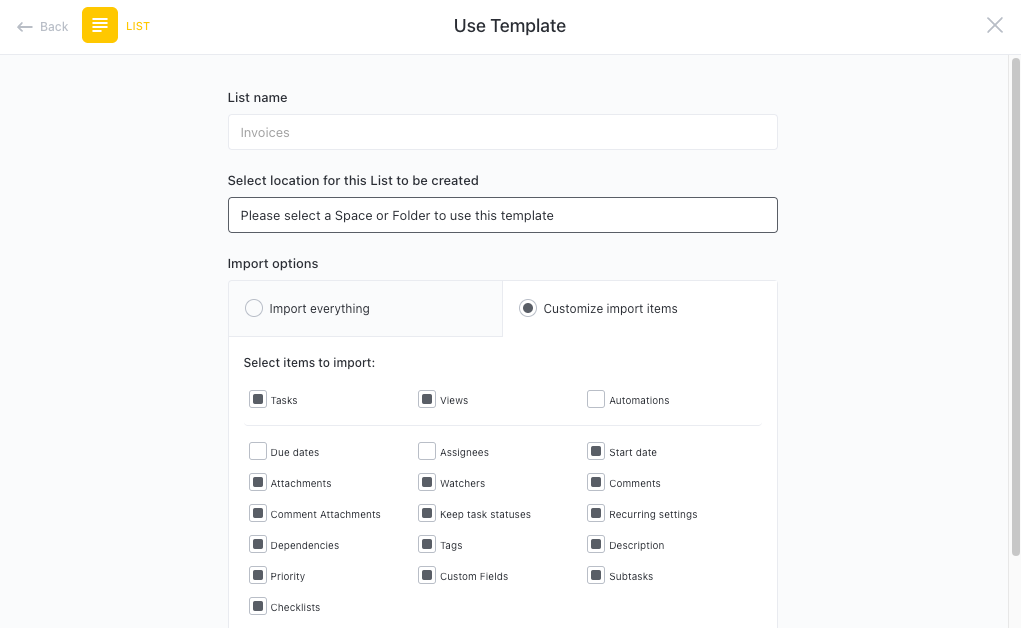Running a non-profit organization is no easy task. With limited resources and a big mission to fulfill, it's crucial to identify the gaps between where you are and where you want to be. That's where ClickUp's Non-Profit Organization Gap Analysis Template comes in!
With this template, you can:
- Assess your organization's current state and identify areas for improvement
- Prioritize initiatives and allocate resources effectively to achieve your goals
- Enhance operational efficiency and streamline processes for maximum impact
Whether you're aiming to increase fundraising efforts or improve program outcomes, this template will guide you every step of the way. Start closing the gaps and making a difference today!
Benefits of Non-Profit Organization Gap Analysis Template
Non-profit organizations play a crucial role in making positive change in the world, and a gap analysis can help them do that even more effectively. With the Non-Profit Organization Gap Analysis Template, you can:
- Identify gaps between your current operations and desired future state
- Prioritize areas for improvement and allocate resources more efficiently
- Enhance your organization's impact by aligning your activities with your mission and goals
- Streamline processes and increase operational efficiency
- Make data-driven decisions to optimize your organization's performance and effectiveness
Main Elements of Non-Profit Organization Gap Analysis Template
ClickUp's Non-Profit Organization Gap Analysis template is the perfect tool for assessing and improving your organization's performance!
With this Whiteboard template, you'll find the following main elements:
- Custom Statuses: Customize your Gap Analysis board with statuses that align with your organization's specific needs, such as “Identified Gap,“ “Action Plan in Progress,“ and “Gap Resolved,“ to track and address gaps in your non-profit operations
- Custom Fields: Utilize custom fields to capture important information for each identified gap, such as “Impact Level,“ “Root Cause,“ and “Assigned Team Member,“ ensuring all relevant details are documented and easily accessible
- Custom Views: Choose from a variety of different views, including the Gap Analysis Board View, the Action Plan List View, and the Progress Tracking Gantt Chart View, to gain different perspectives on your non-profit's gaps and progress towards resolving them
- Collaboration Features: Collaborate with your team by attaching documents and files, leaving comments, and setting task dependencies, enabling seamless communication and coordination as you work towards closing the gaps in your organization
How to Use Gap Analysis for Non-Profit Organization
When it comes to assessing the gaps in your non-profit organization's operations, using a Gap Analysis Template can be a game-changer. Follow these steps to effectively utilize the template and identify areas for improvement:
1. Identify your organization's objectives
Start by clearly defining the objectives and goals of your non-profit organization. This could include increasing donor engagement, improving program outcomes, or enhancing volunteer recruitment. Having a clear understanding of what you want to achieve will help you identify the gaps that are preventing you from reaching your goals.
Use the Goals feature in ClickUp to set and track your organization's objectives.
2. Assess your current performance
Evaluate your organization's current performance by analyzing data and feedback from stakeholders. This could include reviewing financial reports, program evaluations, volunteer feedback, and donor surveys. By understanding where your non-profit stands currently, you can pinpoint the areas that require improvement.
Utilize the Dashboards feature in ClickUp to gather and visualize all the relevant performance data in one place.
3. Identify the gaps
Compare your organization's current performance with the desired objectives. Look for discrepancies or gaps that are hindering your progress. These gaps could be in areas such as fundraising strategies, volunteer management, program effectiveness, or communication methods. Identifying these gaps is crucial in developing targeted solutions.
Use the Table view in ClickUp to organize and categorize the identified gaps for easier analysis.
4. Analyze the causes
To effectively address the gaps, it's important to understand the underlying causes. Analyze the factors that contribute to the identified gaps. This could include factors like limited resources, inefficient processes, lack of training, or ineffective communication channels. By pinpointing the root causes, you can develop strategies to overcome them.
Create custom fields in ClickUp to track the causes associated with each identified gap.
5. Develop an action plan
Once you have identified the gaps and their causes, it's time to develop an action plan to bridge those gaps. Prioritize the gaps based on their impact on your organization's objectives and feasibility of improvement. Then, outline specific steps, assign responsibilities, and set deadlines for each action item. Regularly review and update the action plan to ensure progress is being made.
Use tasks and Automations in ClickUp to create action items, assign tasks to team members, and set reminders for important deadlines.
By following these steps and utilizing the Non-Profit Organization Gap Analysis Template in ClickUp, you'll be able to identify and address the gaps in your organization's operations, ultimately leading to improved performance and greater impact in your community.

Get Started with ClickUp’s Non-Profit Organization Gap Analysis Template
Non-profit organizations can use the Gap Analysis Template to assess their current state and identify areas for improvement in order to better fulfill their mission and achieve their goals.
First, hit “Add Template” to sign up for ClickUp and add the template to your Workspace. Make sure you designate which Space or location in your Workspace you’d like this template applied.
Next, invite relevant members or guests to your Workspace to start collaborating.
Now you can take advantage of the full potential of this template to conduct a comprehensive gap analysis:
- Use the Current State View to assess the organization's current performance and identify strengths and weaknesses
- The Desired Future State View will help you define your organization's goals and objectives
- Utilize the Gap Analysis View to identify the gaps between your current state and desired future state
- Set up tasks to address each identified gap and assign them to team members
- Organize tasks into different statuses to track progress, such as Planning, In Progress, and Completed
- Collaborate with team members and stakeholders to gather input and insights
- Regularly review and update the Gap Analysis to ensure ongoing improvement and alignment with your organization's mission








